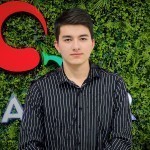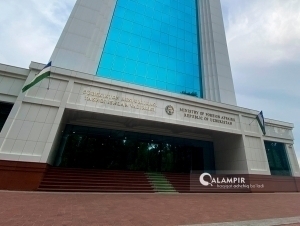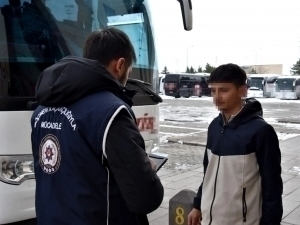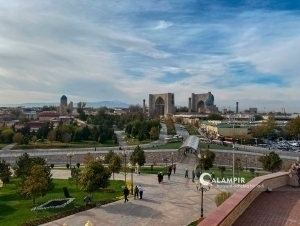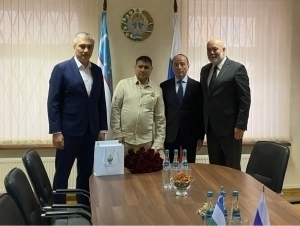Lavrov’s visit to Uzbekistan: Test of diplomacy or display of disrespect?
Review
−
24 April 2025 30855 7 minutes
Sergey Lavrov, the veteran diplomat who has led Russia’s foreign policy for 21 years, recently arrived in Uzbekistan. While experience is often said to speak for itself, it's still unclear whether Lavrov’s long diplomatic tenure helped him accomplish his objectives in Samarkand—or whether he accomplished them at all.
Yet, what is clear is that his actions and remarks during his two-day visit to Uzbekistan have sparked dissatisfaction among the Uzbek public. Let’s take a closer look at the moments that raised eyebrows.
Lavrov touched down in Uzbekistan on the evening of April 22 and was received at Samarkand International Airport by Uzbek Foreign Minister Bakhtiyor Saidov. Despite the warm welcome, the 75-year-old Lavrov, seemingly weary from the flight, avoided a customary embrace. Instead, he placed his hand on Saidov’s shoulder. This seemingly minor gesture stirred criticism across Uzbek social media, where it was viewed as a breach of diplomatic protocol and a sign of disrespect.
Sherzodkhon Kudratkhodja, rector of the Uzbek University of Journalism and Mass Communications, voiced his disapproval, saying Lavrov should have known better.
“If you think about it, a foreign minister should know not to reject a welcoming gesture from his counterpart in front of dozens of cameras, then casually place his paw on his shoulder. This is against diplomatic protocol,” Kudratkhodja remarked. “We no longer accept such gestures as unintentional. We understand that this was meant to show dominance. We are a refined Eastern people. If Mr. Lavrov no longer understands this due to age, then perhaps it’s time for him to resign.”
Kudratkhodja also recalled that even Andrei Gromyko, head of the USSR’s Foreign Ministry during the Soviet era, disapproved of such “teahouse-like arrogance” toward officials of the Uzbek SSR.
“Lavrov, a student of the late Rafik Nishonov, should not be showing such disregard for an official of an equal, sovereign state. Who are you to act uncivilized in a country with 3,500 years of statehood, founded by Amir Temur and countless other great figures? Uzbekistan is home to 40 million people—we are not less than anyone! We are an independent state! Go Uzbekistan!
I say, don’t bring your own rules into another’s home (В чужой монастырь со своим уставом не лезут), comrades!”
That was only Lavrov’s first step on Uzbek soil. And his visit had just begun.
The following day, Russia’s top diplomat visited the “Mother of Mourning” monument in Samarkand to lay flowers. After the ceremony, Lavrov noticed the surrounding inscriptions. The monument bears a message in Uzbek: “You are always in our heart, my dear,” which is also translated into English, but not Russian. Lavrov appeared puzzled.
“I see an English inscription,” Lavrov remarked to the guide. “But I don’t see Russian. Mother is the most holy.”
This statement, too, drew criticism. Alisher Kadyrov, a member of the Legislative Chamber and head of the “Milliy Tiklanish” party, reminded Lavrov that respect should not be demanded.
“Russian politicians are doing everything they can to tarnish the image of Russian culture and language in Uzbekistan. Why do Uzbek youth willingly study English, German, Turkish, and Arabic—without being told to? Lavrov surely knows that forced respect and artificial necessity only backfire,” Kadirov noted.
Another deputy, Odiljon Tojiyev, weighed in: “If Uzbek is ever written on Red Square, then we can talk.”
“The Uzbek people choose languages based on opportunity, not obligation. Artificial promotion of a foreign language does not inspire love—it provokes resistance. Respect is not demanded; it's earned. If Uzbek appears on Moscow’s Main Square, then we can discuss language parity,” he added.
Kudratkhodja also reminded that each sovereign nation decides which languages to display on its monuments, and Uzbekistan is no exception.
“It’s inappropriate for the foreign minister of another country to criticize us over such matters. We are not their colony. Maybe our own ministers should start asking bold questions on Russian soil as well.
For instance, why are our migrants discriminated against in Russia? Why do Russian officials stay silent when local authorities, migration services, or police mistreat them?
Lavrov came here to say, ‘The image of the mother is sacred.’ But while he scrutinizes a plaque, we should remind him: human rights are also sacred,” Kudratkhodja said.
Returning to Lavrov’s official agenda, he held talks with Foreign Minister Bakhtiyor Saidov and later attended a reception with President Shavkat Mirziyoyev. Discussions focused on strengthening Uzbek-Russian friendship, comprehensive strategic partnership, and alliance relations, as well as regional and global issues of mutual interest.
Following the meetings, Lavrov held a 35-minute press conference where he addressed a range of topics and fielded questions from journalists. Among his remarks, he stated that Russia had briefed the Uzbek government on its negotiations with the United States regarding the war in Ukraine.
“We’re sharing detailed updates with our Uzbek friends about the latest developments in resolving the Ukrainian crisis, including U.S. proposals developed in collaboration with Ukrainians and Europeans,” Lavrov explained.
He also downplayed the impact of U.S. tariff policies on Russia-Uzbekistan trade relations.
“I don’t see any threat to our trade with Uzbekistan. These U.S. tariffs may affect Uzbek-American trade, but not ours. Our trade is based on bilateral agreements. Goods don’t pass through Russia in either direction,” he said.
Lavrov also addressed the issue of labor migration, emphasizing that migrants from Central Asia must understand Russian laws and language.
“Globally speaking, reducing the number of labor migrants is not in our interest. A labor shortage could hinder our development plans. However, it is equally important that migrants follow Russian laws and avoid criminal behavior,” he stressed.
And now to perhaps the most telling moment of his visit.
Just a few weeks earlier, on April 3-4, Samarkand had hosted the first Central Asia-European Union summit, attended by the leaders of Central Asian countries, European Council President Antonio Costa, and European Commission President Ursula von der Leyen. The summit elevated relations between the two regions to a strategic level.
Lavrov, however, expressed discomfort with the EU investing in certain sectors in Central Asia. During his press conference, he criticized what he claimed was EU interference, despite asserting Russia’s support for sovereign decision-making.
“We are not against our allies or strategic partners pursuing a multi-vector policy. But it is unacceptable when certain actors try to embed themselves in the state structures of Central Asian countries—especially in sensitive areas such as border security, statistics, and customs—through funding. Our Central Asian partners see this too,” Lavrov warned.
Kudratkhodja responded, asserting that no one has the right to interfere in Uzbekistan’s internal affairs.
“The state chooses its partners and the depth of its relationships. Cooperation with the EU is Uzbekistan’s own decision. This proves the multi-vector nature of our foreign policy,” he stated.
All the events and statements described above are publicly documented. Lavrov’s remarks are on record, and the reactions of Uzbek figures were shared on their social media accounts.
One can only hope that during private meetings, Uzbek officials clearly conveyed their positions and the sentiments of the Uzbek people.
Live
All